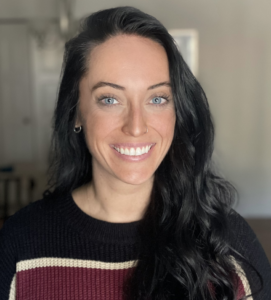Tuesday, March 21, 2023
For Immediate Release
Wade Institute Welcomes Kara Doherty as Education Coordinator
Quincy, MA – The Wade Institute for Science Education welcomes Kara Doherty as our new Education Coordinator! Kara’s experience includes elementary and early childhood education, with particular emphasis on using inquiry-based instruction to promote equity in the science classroom. “I always loved education,” Kara says. She is fascinated by science because it is ever evolving and science education because it teaches flexibility and growth through failure when investigations produce unexpected results. “With science, there are so many different avenues to get to an answer. Sometimes your answer is more questions. It shows kids that you aren’t always going to get an answer.”

Photo courtesy of Kara Doherty
Kara received a dual Bachelor of Science in Early Childhood and Elementary Education from Champlain College and her Masters degree in Curriculum and Instruction from Merrimack College. She advocates for equity in education and has demonstrated that passion through the professional learning communities she’s joined including Students and Teachers Against Racism and several anti-bias book clubs. In 2022, her efforts were recognized through a nomination for the Massachusetts Department of Education’s Massachusetts State Teacher of the Year (STOY) award.
Through years of teaching elementary and early childhood classes, Kara has observed that students have more success learning science when the investigations are inquiry-based, hands-on, and experiential. She also witnessed that some students almost exclusively learn in hands-on and immersive learning settings. Kara used these observations to develop her pedagogy skills and shift her practice so that her lessons could be more accessible and inclusive for all types of learners. “Something that makes me feel hopeful is the consistent reinforcement that students will always rise to the occasion,” Kara says. “Teachers can sometimes feel like your expectations are so far beyond what’s age appropriate, and then your students ‘WOW’ you nearly every time. Students of all ages are so capable of great discoveries and advanced scientific thinking. They’re able to do so much of the discovery on their own when simply provided the tools.”
The constant changes impacting education in the past few years have refined for Kara the importance of adopting inquiry-based instruction as a model of best practices for classroom teaching. “As educators, we’re taught very early that there are a multitude of learning styles that your students will use as they navigate the classroom environment,” she says. It has been student-centered learning models that have enabled educators to engage students that may not otherwise be interested in science. The enhanced use of technology for teaching purposes is another major shift that Kara has noticed. This means that “it’s important that today’s educators are given the opportunity to strengthen their skills with technology and engineering, and are given time to collaborate with other educators to provide the best learning experiences they can for their students.”
As part of the Wade Institute, Kara looks forward to supporting fellow educators’ STEM knowledge and pedagogy skills, and connecting them with local STEM resources. “The partnerships caught my attention,” she says. “These are places I could only experience once or twice as a teacher on a field trip.” Kara is inspired by the Wade Institute’s collaborative approach to science professional development programming, especially that educators can explore local STEM venues and gain resources by choosing the opportunities that best meet their current professional learning needs.
###
The Wade Institute for Science Education specializes in providing inquiry-based, hands-on, minds-on, science, technology and engineering professional development for K-12 teachers and informal educators. For more information, visit www.wadeinstitutema.org or call 617-328-1515.
